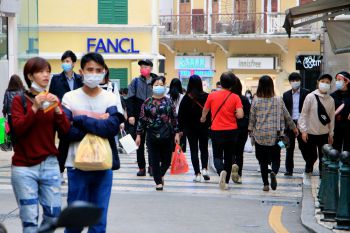In with the in-group: Covid-19 and public compliance
By: Neil Vowles
Last updated: Monday, 2 November 2020

A new study sheds fresh light on the conditions under which people in groups follow the behaviour of others, which can help understand human behaviour in relation to Covid-19 restrictions.
The new research, a collaboration between the University of St Andrews, the University of Sussex and University College London and published in the journal PLOS ONE, reveals that copying others’ behaviour depends on shared group membership.
Traditionally it has been assumed that this is a rather mindless and automatic process which has been called ‘contagion’.
However, the new study reveals that things are not that simple – people do not follow just anyone.
The interactive experiment, which took place at the Science Museum in London, revealed that people will follow other in-group members, whose behaviour we believe to be relevant for our own. An in-group is a social group to which a person psychologically identifies as being a member.
Over 1,000 participants voluntarily took part in the experiment. Each person had the ability to control a dot on a shared screen using a mobile phone or tablet. This meant that groups of participants could take part in virtual collective tasks such as following a maze.
During the study, participants were split into blue and red groups based on a bogus personality test. The researchers added fake blue and red dots which were pre-programmed to act in specific ways, and then examined whether participants mimicked the actions of these dots.
The results showed that participants mimicked the behaviour of others.
However, participants only copied the behaviour of fellow ‘in-group’ members (i.e. dots who shared their group’s colour) and not ‘out-group’ members (i.e. dots who did not share their group’s colour). Moreover, participants did not copy others if the task was irrelevant to their group membership.
The findings suggest that mimicry is not passive or automatic, and that other group members are diagnostic of how one should act oneself.
The conclusions of this research have important implications for designing behavioural interventions and could be significant in understanding human compliance in relation to Covid-19 restrictions.
John Drury, Professor of Social Psychology at the University of Sussex, said: "The Covid-19 pandemic demonstrates the importance of the examples set by ingroup members, such as our peer groups, colleagues, and neighbours. When they wear masks, keep their distance and wash their hands, it reminds us that we should be adopting these behaviours too."
Lead researcher Dr Fergus Neville, lecturer in the School of Management at the University of St Andrews, said: “The results from this study help to explain the variability in social imitation during emergency evacuations, such that people are more likely to be influenced by those who they see as fellow group members.”
Professor Stephen Reicher, from the School of Psychology and Neuroscience at the University of St Andrews, said: “The fact that people are more likely to imitate others who they regard as ‘in-group’ is critical for maximising public compliance with safety protocols during the COVID-19 pandemic. If the public see those who are providing them with guidance as ‘we’ instead of ‘they’, adherence to public health measures will be much higher.”
